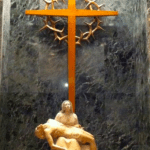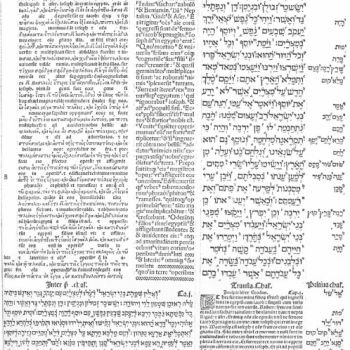Low Sunday
The first Sunday after Easter is known in the English tradition as “Low Sunday.” It has other names; one of the more famous is “Quasimodo Sunday,” after the first two words of today’s introit1: Quasi modo geniti infantes rationabile sine dolo lac concupiscite (“Like as newborn infants, desire the milk spiritual, without deceit”). It is after this introit that Victor Hugo’s Quasimodo is named. The origin of the English name isn’t certain. One theory is that it’s in contrast with Easter itself, the highest of all feasts of the year; another (which seems a little more plausible to me) is that low here is a corruption of the word laudes, “praises,” the first word of a sequence2 sung in the Sarum Use.3
This year it’s the third Sunday of the month, obviously. I’ve been going to a different parish on third Sundays, as it has a social event on them and I’ve been trying to get plugged into some community. Why that community instead of my own parish is—well … this is gonna be rough.
Midway This Way of Life We’re Bound Upon
I’ve been taking stock of things lately. Last year, I turned thirty-five (a very attractive age, which many London women of the very highest birth have, of their own free choice, remained for years); it feels uncomfortable to admit, but I really didn’t expect this much of my life to end up the way it has. I mean, hell, when I was a kid, and even into my early teens, I expected to be married and have at least a couple of children of my own by now.
Which is emblematic of how much, and why, things have gone so differently from what I was taught to expect, hope for, and pursue. I feel like I’ve spent the last ten years just kind of waiting for my life to start. But being gay threw even more of a wrench in all that than I was expecting. Professional ministry and starting a family—which, for Catholics, are the two main frameworks for “being an adult”—are both closed to me; I thought I was supposed to discern my vocation, whatever it was, and then follow that, and so I’ve been trying to discern, but without the faintest idea what it could look like. I’ve been wondering a lot lately whether viewing it through the lens of “discerning my vocation” was perhaps a bad idea in the first place. Or (and this may be the same sentiment in different words) whether my notion of vocation was entirely too crude to be helpful. Even I knew better than to think it would be Weird Sisters making prophecies on a blasted heath, but I did imagine that there would be a romantic epiphany of some kind about Where I Am Meant To Be. When really, I now suspect, there are just people, doing what they can with their gifts. My conception was framing God’s plan and my freedom as operating on the same level, wasn’t it?
Except … what gifts I have, when I’ve tried to offer them to the church, seem to be unwanted. The last parish I attended, I talked to one of the priests to see if I could help with leading a Bible study or something. I was told, essentially, “No thanks.” While involved with the young adult ministry at the same parish, I suggested we might reach out to people in Baltimore’s activist community (as I had ties to it), and the room recoiled at the notion of associating itself with leftists. Invited to be involved in a catechetical program at another parish, I emailed the priest with some concerns about the curriculum being used, asking that an alternative be considered; he replied in so many words that my not liking the curriculum showed that I was emotionally stunted. Even manual labor—I used to do light janitorial work at my current parish, until I was replaced by professionals.
A Simply Tendered Hate
I think I’ve spoken before now about an incident on my parish’s Facebook group (of all ridiculous things) from a few years ago. Fr. James Martin had advanced the speculative possibility that St. John Henry Newman might have been gay. Not that he might have been unchaste—that is not what the word gay means; it just denotes a man who’s attracted to men rather than women. There isn’t much (if any) definite evidence for it, but I’m sentimental enough to feel that it’d be rather nice to have a saint in heaven who understands such a major aspect of my experience.
This sentiment was apparently not shared by my fellow parishioners. The news about Fr. Martin’s speculation was shared to the group by a friend of mine with immense indignation, which was hurtful enough; one of the replies, from someone I had always gotten along with before then, was a fond reminiscence about how in the Good Old Days™ the Jesuit father would have been jailed or even executed for saying something like that.
Jailed or executed. And not even for actually doing anything to concretely protect or support LGBT people—just for saying something nice.
How viciously do you need to despise and hate a group of people for that to be your reaction here?
Someone will say “Come on, there’s no way he meant it. It was just a joke, lighten up!” Yeah, I’m sure it was just a joke. It isn’t funny to me. Especially not when this whole thing took place within a year or two of the Pulse massacre. I’ve been carrying that hurt ever since, partly because I’m naturally disposed to brood, and partly because I’m terrified of letting my guard down again, which I had before that nasty joke was made. Sitting in the undercroft at my third-Sundays parish today, I thought, I wonder which of these people would make that joke. Which ones would be happy, or think it was funny, if I were dead.
In Sæcula Sæculorum
I have no concluding volta, no follow-up, no nice lesson to tie this post off with a bow.
I know there’s a lot of self-pity in this. But I’m getting desperate and I don’t know what to do.
1An introit is the chant used during the entry procession of Mass. Most introits are taken from some text of Scripture.
2A sequence is another chant from the Mass, one usually tailored to a specific solemn feast and used only then. Though generally placed before the Gospel reading in modern usage, it originally followed the Gospel, hence the name sequentia, “following.”
3The Sarum Use—also referred to, less accurately, as the Sarum Rite—was the most widespread form of the Mass in medieval Britain, named after the city of Salisbury (known in Latin as Sarum) from which it originated; it was a form of the Roman Rite. Other uses were known, including those of Aberdeen, Bangor, Hereford, and York, but the Sarum was the most prevalent. It was the chief source from which Thomas Cranmer devised the Anglican service of the Book of Common Prayer, and a version of it underlaid the liturgical ideals set forth by the Oxford Movement in the mid-nineteenth century.













